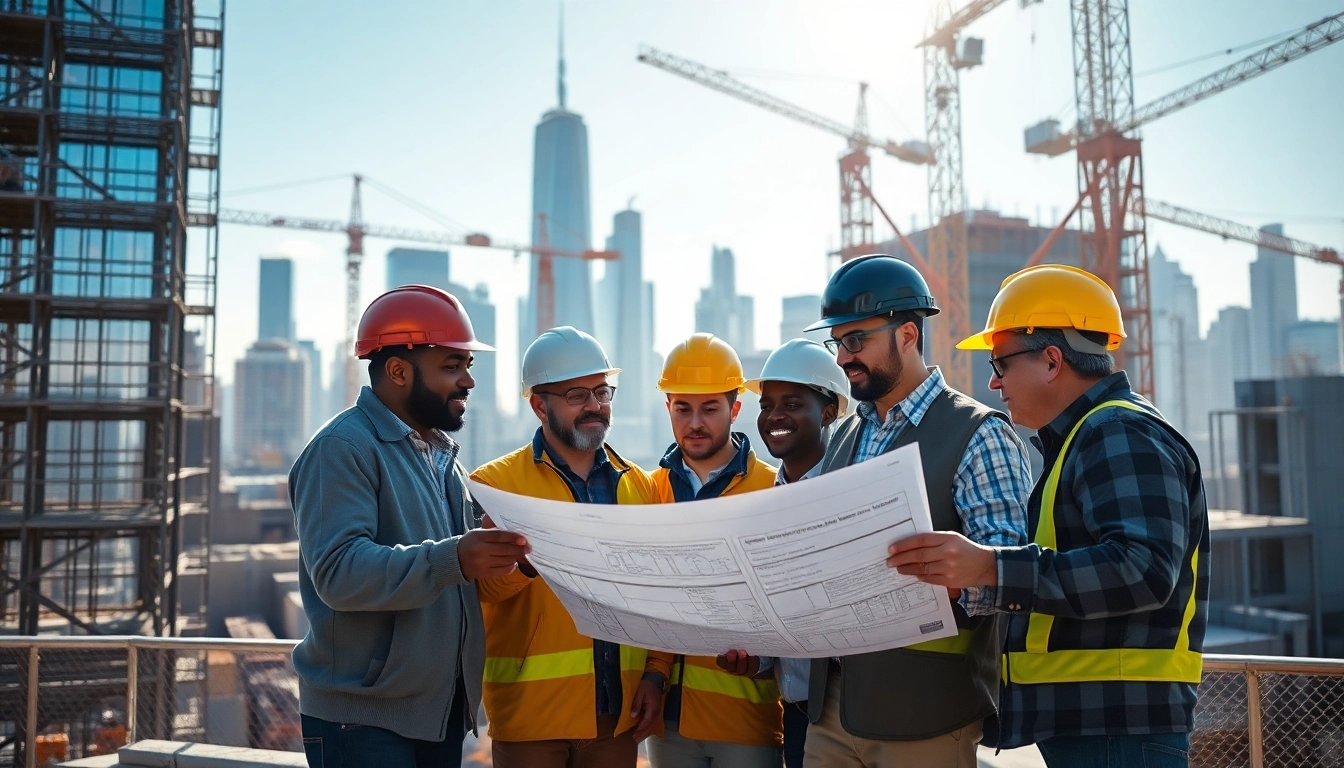
Understanding the Role of a New York Commercial General Contractor
What is a New York Commercial General Contractor?
A New York Commercial General Contractor is a professional responsible for overseeing construction projects in various sectors, including retail, office space, and industrial environments. They act as the main point of control for a project, managing subcontractors, suppliers, and the overall logistics to ensure that construction tasks are completed systematically and efficiently. Unlike residential contractors, commercial contractors specialize in larger scale projects that often involve stricter regulations, higher stakes, and complex organizational structures.
Key Responsibilities of a New York Commercial General Contractor
The responsibilities of a New York Commercial General Contractor are extensive and multifaceted, often encompassing several roles throughout the lifecycle of a construction project:
- Project Planning: Establishing timelines, budgets, and workflows in consultation with clients and stakeholders.
- Bidding and Estimation: Preparing detailed cost estimates and procuring bids from subcontractors and suppliers.
- Contract Management: Overseeing contracts to ensure compliance from all parties involved and mitigating risks associated with contractual obligations.
- Site Management: Coordinating daily operations on-site to maintain quality control, safety, and adherence to design specifications.
- Client Liaison: Serving as the main point of communication between clients and the construction team, providing updates and addressing any concerns.
How a New York Commercial General Contractor Adds Value to Your Project
Hiring a New York Commercial General Contractor offers numerous advantages that can significantly enhance the outcome of your construction endeavor:
- Expertise: They bring specialized knowledge that enables them to navigate the complexities of commercial construction with ease.
- Time Savings: A seasoned contractor efficiently manages various project components, reducing delays and ensuring adherences to structured timelines.
- Connection to Resources: They possess established relationships with subcontractors and suppliers, which can lead to cost savings and reliable service delivery.
- Risk Management: With experience in identifying potential risks, they can proactively implement solutions that protect the project’s budget and timelines.
Identifying Qualified New York Commercial General Contractors
Essential Qualifications to Look For
When searching for a qualified New York Commercial General Contractor, it’s crucial to consider certain qualifications that indicate a contractor’s ability to deliver on their promises:
- Licensing: Ensure the contractor possesses the appropriate licenses required by New York state regulations, highlighting their professional legitimacy.
- Insurance: A reputable contractor should carry liability insurance and workers’ compensation to protect you from unforeseen liabilities.
- Certifications: Additional certifications from recognized organizations can signify advanced knowledge and commitment to industry standards.
How to Verify Credentials and Licenses
Verifying credentials and licenses is essential in confirming a contractor’s legitimacy and preventing potential issues:
- Check Local Listings: Access the New York Department of State’s website or local building departments to verify licensing status.
- Request Documentation: Ask the contractor directly for copies of their licenses and insurance certificates to review their coverage limits.
- Dive into Online Reviews: Research online reviews on platforms such as Google and Yelp to gauge prior client satisfaction and overall reputation.
Evaluating Experience and Expertise in the Industry
A contractor’s experience directly influences the successful execution of your project. To evaluate a contractor’s expertise:
- Past Projects: Review case studies or portfolios of completed projects similar to your own in scope and size.
- Client References: Request and follow up on references to understand past clients’ experiences and the contractor’s approach to problem-solving.
- Industry Recognition: Look for awards or recognitions that can validate the contractor’s standing within the commercial construction community.
Common Challenges in Hiring a New York Commercial General Contractor
Overcoming Budget Constraints
One of the most significant challenges in hiring a New York Commercial General Contractor is adhering to budgetary limitations. Here are some insights for overcoming this hurdle:
- Transparent Communication: Discuss your budget openly during initial conversations to ensure the contractor can devise a plan that fits your financial parameters.
- Prioritizing Needs: Determine which aspects of the project are essential versus those that are more flexible. This prioritization helps in allocating funds efficiently.
- Request Detailed Estimates: Obtain comprehensive breakdowns of costs and explore options for sourcing alternative materials or approaches to save money.
Managing Timeline Expectations
Aligning project schedules with client expectations is vital yet challenging. Here are strategies to manage timelines effectively:
- Set Realistic Milestones: Work collaboratively with your contractor to set achievable milestones based on various project components.
- Regular Progress Meetings: Implement weekly progress meetings to address any timeline deviations and recalibrate expectations as necessary.
- Contingency Plans: Prepare for unforeseen delays by establishing contingency timelines that provide a buffer for unexpected issues.
Navigating Local Regulations and Permits
Dealing with New York’s intricate codes and regulations can be overwhelming. Streamline this process with these approaches:
- Research Local Requirements: Familiarize yourself with municipal zoning bylaws and building codes that may affect your project.
- Engage the Contractor Early: Ensure the contractor takes the reins on obtaining necessary permits and understand how local regulations may impact construction schedules.
- Stay Updated: Keep informed about any changes in local legislation that could affect your project progress or requirements.
Best Practices for Collaborating with Your New York Commercial General Contractor
Establishing Clear Communication Channels
Effective communication is imperative when working with a contractor. To facilitate this:
- Define Points of Contact: Clearly identify individuals responsible for managing communications on both sides to streamline the flow of information.
- Use Project Management Tools: Consider project management software to track schedules, budgets, and document sharing for transparent collaboration.
- Schedule Regular Updates: Establish a consistent schedule for updates where both teams can discuss progress and address concerns.
Setting Realistic Timeline and Goals
Setting achievable goals and realistic timelines helps keep the project on track:
- Work Backwards: Begin with your project deadline and work backwards to establish realistic intermediate goals for each phase of construction.
- Consider External Influences: Factor in potential external delays, such as weather or supply chain disruptions, that could impact project timelines.
- Regularly Review Goals: Assess goals periodically and adapt as required to stay aligned with overall project vision and timelines.
Evaluating Performance Throughout the Project
Monitoring your contractor’s performance is essential for ensuring project success:
- Establish Evaluation Criteria: Develop key performance indicators (KPIs) that are measurable and align with project expectations.
- Feedback Loops: Create a system for providing constructive feedback during project execution, facilitating continuous improvements.
- Documentation: Keep detailed records of progress, changes, and communication to evaluate overall performance accurately.
Success Stories: Effective Partnerships with New York Commercial General Contractors
Case Study: Large Retail Development
A large retail chain faced challenges with its new flagship store in New York City due to tight deadlines and intricate design requirements. By partnering with a seasoned New York Commercial General Contractor, the project was executed seamlessly within budget and time constraints. Effective communication channels allowed for real-time updates, while the contractor’s understanding of local regulations facilitated swift permit acquisition. Ultimately, the retail chain opened on time, surpassing expected sales targets in the first quarter.
Case Study: Cutting-edge Office Space Construction
In a highly competitive market, a technology startup sought to create an innovative office space that reflected its brand identity. Their collaboration with a New York Commercial General Contractor proved vital in translating vision into reality. The contractor utilized cutting-edge construction techniques and sourced sustainable materials to comply with environmental standards. Regular progress meetings contributed to maintaining the timeline, and the result was a contemporary office that attracted top talent and improved overall productivity.
Case Study: Sustainable Projects in Urban Areas
As sustainability became a key focus in construction, a developer aimed to construct an eco-friendly residential complex in a densely populated urban neighborhood. Working with a New York Commercial General Contractor specialized in sustainable building practices, the project integrated renewable energy solutions and eco-conscious design principles. The contractor’s expertise in navigating local environmental regulations ensured the project met all necessary approvals, ultimately leading to a completed complex that became a model for future developments.






